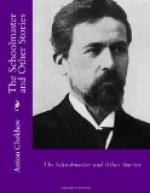“Prokofy Osipitch,” continued the orator, looking with an air of inspiration into the grave, “your face was plain, even hideous, you were morose and austere, but we all know that under that outer husk there beat an honest, friendly heart!”
Soon the listeners began to observe something strange in the orator himself. He gazed at one point, shifted about uneasily and began to shrug his shoulders too. All at once he ceased speaking, and gaping with astonishment, turned to Poplavsky.
“I say! he’s alive,” he said, staring with horror.
“Who’s alive?”
“Why, Prokofy Osipitch, there he stands, by that tombstone!”
“He never died! It’s Kirill Ivanovitch who’s dead.”
“But you told me yourself your secretary was dead.”
“Kirill Ivanovitch was our secretary. You’ve muddled it, you queer fish. Prokofy Osipitch was our secretary before, that’s true, but two years ago he was transferred to the second division as head clerk.”
“How the devil is one to tell?”
“Why are you stopping? Go on, it’s awkward.”
Zapoikin turned to the grave, and with the same eloquence continued his interrupted speech. Prokofy Osipitch, an old clerk with a clean-shaven face, was in fact standing by a tombstone. He looked at the orator and frowned angrily.
“Well, you have put your foot into it, haven’t you!” laughed his fellow-clerks as they returned from the funeral with Zapoikin. “Burying a man alive!”
“It’s unpleasant, young man,” grumbled Prokofy Osipitch. “Your speech may be all right for a dead man, but in reference to a living one it is nothing but sarcasm! Upon my soul what have you been saying? Disinterested, incorruptible, won’t take bribes! Such things can only be said of the living in sarcasm. And no one asked you, sir, to expatiate on my face. Plain, hideous, so be it, but why exhibit my countenance in that public way! It’s insulting.”
MALINGERERS
MARFA PETROVNA PETCHONKIN, the General’s widow, who has been practising for ten years as a homeopathic doctor, is seeing patients in her study on one of the Tuesdays in May. On the table before her lie a chest of homeopathic drugs, a book on homeopathy, and bills from a homeopathic chemist. On the wall the letters from some Petersburg homeopath, in Marfa Petrovna’s opinion a very celebrated and great man, hang under glass in a gilt frame, and there also is a portrait of Father Aristark, to whom the lady owes her salvation —that is, the renunciation of pernicious allopathy and the knowledge of the truth. In the vestibule patients are sitting waiting, for the most part peasants. All but two or three of them are barefoot, as the lady has given orders that their ill-smelling boots are to be left in the yard.
Marfa Petrovna has already seen ten patients when she calls the eleventh: “Gavrila Gruzd!”




